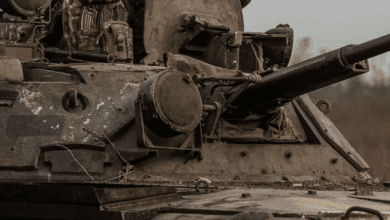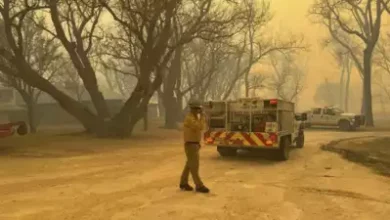Russia leaves Karabakh in silence, giving up its influence “for good.”
Four years ago, when Russian forces arrived in Nagorno-Karabakh, their mission was crystal clear: maintain harmony between Armenia and Azerbaijan, longtime enemies, and avert another conflict in the unstable area.

But the Russian mission seemed doomed when Azerbaijani troops stormed across hilly Karabakh last September, crushing Armenian separatist forces in a matter of hours.
This week, the Kremlin covertly announced that the peacekeepers were leaving a territory it had long regarded as its own backyard, taking their gear and weapons with them as well as Russian influence.
For the first time in two centuries, Russians are fleeing, and we are seeing a historic movement, independent Azerbaijani expert Elhan Shahinoglu told AFP.
During both the Russian Empire and the Soviet period, Moscow governed over the Caucasus area. Moscow attempted to mediate the conflict that erupted between Armenia and Azerbaijan after the fall of the USSR.
As part of a ceasefire agreement that put an end to six weeks of grueling combat between the arch enemies over the Karabakh territory, the Kremlin sent out about 2,000 soldiers in 2020.
The agreement lasted until the sudden Azerbaijani attack in September of last year, which sparked the departure of over 100,000 Armenians from Karabakh and increased their resentment against Moscow.
Russia “lied to us”
“The last hope that the population will return home is gone along with the Russians leaving Karabakh,” Iveta Margaryan, a 53-year-old qualified accountant, said while chatting with passersby in the capital of Armenia.
She went on, “The Russians have betrayed us.”
Caucasus observers claim that Russia is too preoccupied with its invasion of Ukraine to continue dominating the area.
Recently, Azerbaijan has strengthened its relationship with Turkey, a close political and military ally with similar cultural traditions. Armenia is now far more estranged from Moscow as a result of the withdrawal from Karabakh.
While Prime Minister Nikol Pashinyan is concerned with developing stronger connections with the West, Yerevan has criticized Moscow for what it sees as its shortcomings.
He suspended Yerevan’s membership in the defense alliance of numerous former Soviet governments, the Collective Security Treaty Organization, which is headed by Moscow, in February.
In addition, Yerevan defied Moscow’s desires and joined the International Criminal Court (ICC), binding it to detain Vladimir Putin should he ever go to Armenia.
Moscow is now playing second fiddle to the United States and the European Union in its attempts to mediate a peace deal between the adversaries of the Caucasus.
“Shattered” notion
Moscow’s public disquiet about Armenia’s warming relations with the West has also surfaced. This week, the foreign ministry insisted Yerevan “disavow” rumors that it was strengthening military relations with Western nations.
A significant Armenian diaspora resides in France, which has also raised its flag in the area, bolstering diplomatic support for Yerevan and supplying advanced defense radars and missiles.
Eldar Namazov, a political scientist from Azerbaijan, said, “Russia is out, the West is in.”
“It was intended for the Russian peacekeepers to “project influence,” according to Gela Vasadze, senior fellow at the Georgian Strategic Analysis Center.
However, he told AFP that their removal had amply shown the limits of Russia’s authority.
“The myth that Russian boots never leave territories they had once stepped in is shattered.”
According to Shahinoglu, Putin left Karabakh in order to maintain cordial ties with Turkey and Azerbaijan during the Kremlin’s isolation due to the conflict in Ukraine.
However, he said that by doing this, Russia has lost the capacity to “exploit” Armenian separatism in the Caucasus and use it as a means of gaining influence in the area.
“Russia has lost its historical footholds in the Caucasus for good.”
This feeling was also expressed in Azerbaijan, where people rejoiced and expressed relief upon hearing of the Russian withdrawal.
“People say that Russian troops never leave on their own volition,” said 37-year-old courier Ramil Iskenderov.
“Azerbaijan proved that with the right policy it’s possible to achieve the impossible,” he said to AFP.
Some in Armenia, where Russia still has a military post, felt that Yerevan should cut military relations with Moscow after the peacekeepers’ departure.
“Russia has sold us out and deceived the Armenian people once again. That’s all,” said Valery Harutyunyan, who fled to Armenia in September after living in Karabakh.
“The Russians are no longer a reliable source. It’s not feasible. We need to expel Russians from both Armenia and Karabakh, the man told AFP.






